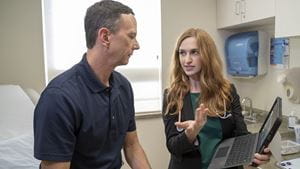
Patient-Centered Care (PCC) is increasingly recognized as a cornerstone of healthcare delivery, and St. Lawrence Health (SLH) staff implement this practice with every patient.
Keri Allen, SLH Sr. Director of Corporate Compliance and Patient Experience, noted there are a variety of important reasons to take note of October being Patient-Centered Care Awareness Month.
“Evidence shows that PCC can lead to better health outcomes. When patients are actively involved in their care and treatment decisions, they are more likely to adhere to treatment plans, leading to improved outcomes,” Allen said.
“Patients who feel listened to, respected, and involved in their care decisions tend to have higher satisfaction with their care,” she added.
When patients have a positive experience, the trust they have in their healthcare providers increases, which is essential for open communication. When patients trust their providers, they are more likely to share all relevant information about their health, leading to more informed decision-making between patient and provider.
“PCC also recognizes the importance of families and caregivers in a patient's health journey. It integrates their input and provides them with the necessary support, which can be crucial for chronic or severe conditions,” Allen said. “Patient-centered care is a vital approach in healthcare because it places the patient at the heart of the care process. By doing so, it not only improves the quality of care, but also enhances the overall healthcare experience for both patients and providers.”
There are a multitude of individuals from various departments who are involved in a patient’s care, which means they are also involved with that person’s loved ones.
“I think our Care Partner Program throughout St. Lawrence Health is an excellent example of how our nurses and the patient’s healthcare team use the PCC to involve our patients’ families,” said Lisa Lougheed, SLH Chief Nursing Officer and Vice President of Quality.
“A care partner can be a spouse, family member or friend who our patient identifies as someone who helps support them in their care and well-being,” she said. “This special individual is a valuable resource to our nurses and providers, as the Partner can explain how the medical team can better serve their loved one.”
Nurses further offer patient-centered care through their daily interactions with patients. Communication is a key principle of PCC, and when healthcare providers communicate openly, honestly, and clearly, it greatly enhances the patient’s experience and improves clinical outcomes.
The nursing staff throughout SLH are exceptional at delivering PCC because not only are they trained in this type of care, but it is also part of who they are. Most nurses go into this line of work because they have an innate desire to help people, and are further trained on having compassionate interactions that enhance the patient and family’s involvement in care.
The SLH Patient Experience Department and patient-centered care concept are deeply intertwined and are crucial to the delivery of high-quality healthcare. The department and concept reinforce each other, creating the essentials for optimal care delivery.
Patient Experience is not only a department, but also refers to the perception each patient has regarding the care they receive; it covers a variety of interactions, from the cleanliness and quietness of the hospital, to communication with the healthcare team.
“PCC is an approach where the patient is at the center of care delivery. It respects the patient's preferences, needs, and values, and ensures they are the ones who guide clinical decisions. PCC recognizes the patient as a unique individual and not just a medical condition,” Ms. Allen said.
The department of Patient Experience acts as an avenue to gather patient feedback, then takes that information to the clinical team to provide them with opportunities to improve patient-centered care. Patient Experience members further work directly with patients and their families throughout their time at Canton-Potsdam, Gouverneur, or Massena Hospital.
Patient-centered care does not end when a patient is released from the hospital; they are given education about their condition and what they need to do to continue care at home. If needed, they are connected with home care services, which may include SLH’s Patient-Centered Medical Home model that involves the patient’s care partner. For other patients, follow-up appointments with their provider may be the decided upon route.
“Patients also receive a post-discharge phone call to ensure they are doing well, were able to get any prescriptions ordered, were able to make their outpatient appointments, and to determine if they need any additional assistance from the care team,” Allen said.